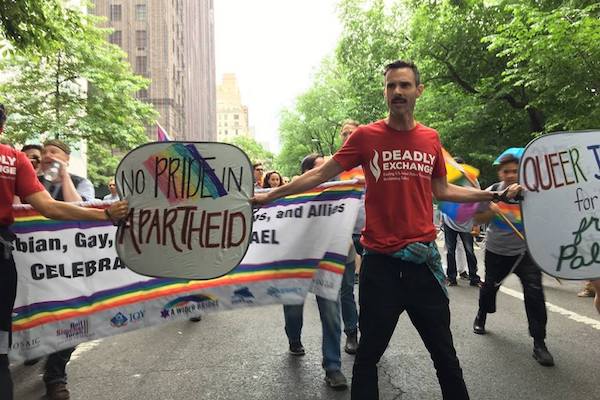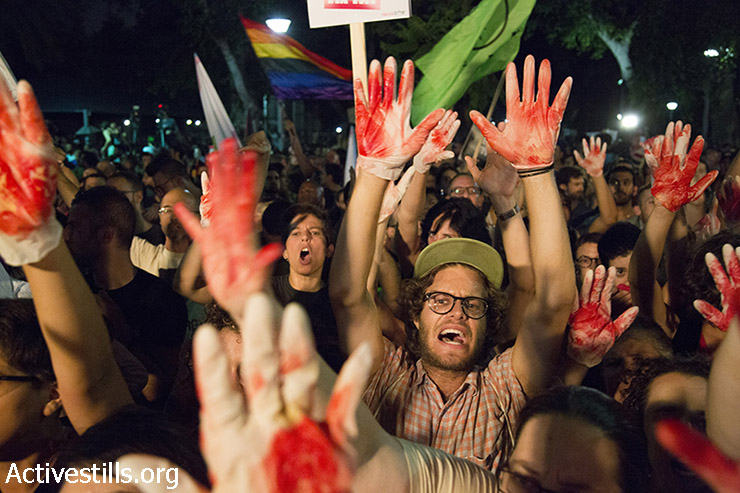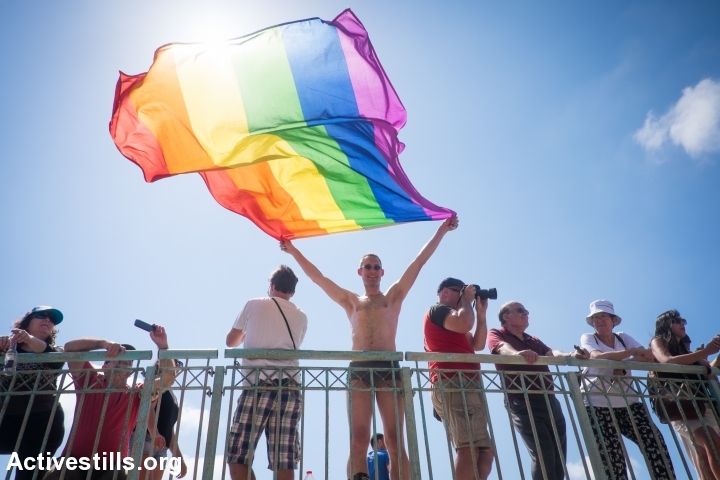We were labeled homophobes and racists for disrupting a group of queer Jews at a pro-Israel parade this month. But as queer Jews ourselves, we could not stand aside while being used to distract from Israel’s treatment of Palestinians.
By Stephanie Skora

Just under two weeks ago, on the eve of the 50th anniversary of Israel’s occupation, members of Jewish Voice for Peace (JVP) staged six disruptions of the Celebrate Israel parade in New York City. There were several points of protest, including support among New York politicians and Jewish organizations for Israeli policies; the NYPD’s participation in the parade; and exchange programs between Israeli security services and U.S. law enforcement (including the NYPD), which involve sharing “worst practices” that disproportionately affect people of color.
Yet the disruption of the parade’s LGBTQ contingent by queer and trans Jews provoked the most vitriol. The group, which held signs reading “No Pride in Apartheid,” had organized the disruption in response to an open call for participation by the parade’s LGBTQ contingent.
Although the action was planned by queer Jews to send a message to their own communities that they cannot celebrate while Palestinians are denied basic rights, JVP was accused of antisemitism and homophobia. A statement from Jewish Queer Youth even compared JVP’s actions to that of a “hate group.”
As a transgender lesbian, a proud anti-Zionist Jew, and a JVP member, I have been particularly troubled by the charges of homophobia. I am used to the unfortunately common accusations of anti-semitism against activists for Palestinian rights, which simply cheapen and distort the meaning of the term while distracting from the human rights issues at stake. But accusations of homophobia felt like a new low in attempts to denigrate Palestinian solidarity activists, and to avoid hearing what they have to say.

The queer JVP activists at the Celebrate Israel parade sought to disrupt pinkwashing, the term commonly used to describe the Israeli government marketing a positive image of LGBTQ rights in the country to distract from, and even excuse, its ongoing denial of basic human rights and freedoms to Palestinians.
Born out of the 2005 Brand Israel marketing campaign, and expanded in 2009, pinkwashing often takes the form of city and campus tours by queer or trans Israelis, Islamophobic and racist ads and flyers about how poorly Palestinian queers are treated in Palestine, and Israeli organizations participating in gay pride parades across the United States (or in this case, LGBTQ organizations participating in parades that celebrate Israel).

Israel does not perform same-sex marriages; has its own version of a Religious Freedom Restoration Act (legislation which U.S.-based activists might remember from 2015, when Indiana’s then-Governor Mike Pence signed a much-maligned similar bill); and failed to pass a package of comprehensive LGBTQ rights legislation following the 2015 stabbing death of a teenager in the Jerusalem Pride Parade. Yet the Brand Israel initiatives market the country as a paradise for queer and trans people around the world.
Pinkwashing operates on the same tired racist, Islamophobic tropes that Israel has always relied on to market itself: portraying Palestinians, Arabs more broadly, and especially Muslims, as violent, close-minded, and unwilling to accept difference or diversity, while presenting Israel as a liberal haven in a “barbaric” Middle East.

But in reality Israel’s supposed support for LGBTQ rights applies to Jews only: queer and trans Palestinians don’t have equal rights in the State of Israel, nor are they accepted as refugees. And neither are Arabs from any other nation that Israel’s defenders quickly brand as homophobic.
Despite Israel’s claims that queer and trans Palestinians find a safe haven in Israeli territory, a 2014 report revealed that Israeli intelligence operatives regularly blackmail gay Palestinians, forcing them to serve as informants. Pinkwashing mobilizes the idea of queer and trans Palestinian suffering to humanize the very state that causes Palestinian suffering in the first place, with ongoing practices described by the UN and Amnesty International as ethnic cleansing and apartheid. And while the Palestinian Authority itself is no friend to Palestinian queers, the Israeli government’s claim that it provides a refuge to queer and trans Palestinians is specious at best, and an outright lie at worst.
It is not homophobic to object, as queer and trans Jews, to the use of our identities to justify horrific violence against Palestinians. These are the contradictions that anti-pinkwashing demonstrations such as the disruption at the Celebrate Israel parade seek to expose, and precisely why critics woefully miss the point when they brand JVP and our members as violent homophobes: we are the ones using non-violence to protest violence, homophobia, and the deployment of queer and trans Jewish lives to erase Palestinian ones.
Conversations on pinkwashing are complex. Having the Israel narrative we’ve heard all our lives challenged by the reality of its racist and cynical policies can be upsetting. But that doesn’t excuse us from facing up to them.

Nonviolent protests and disruptions like the one at the LGBTQ contingent of the Celebrate Israel parade aren’t an attempt to disparage or scare young queer and trans Jews, as some have alleged. They are an attempt to expose harsh truths about the impact of Israel’s policies on Palestinians and to encourage our queer Jewish peers to think again about what it means to “celebrate” Israel.
Agitation and direct action have a proud Jewish and a proud queer history. As educators and activists, we constantly tell ourselves that the best way to learn is to be uncomfortable, and that we have to sit in that discomfort so that we can better ourselves. The goal of protest is to open conversations, especially those that have been avoided or shut down, and to assert the humanity of oppressed peoples.
Now that this conversation is open, let’s talk.
Stephanie Skora is a transgender woman, a femme lesbian, and Jewish activist for Palestinian rights based out of Chicago. She organizes extensively with Jewish Voice for Peace, and focuses on anti-pinkwashing, anti-Zionist education, and queer and trans liberation.

